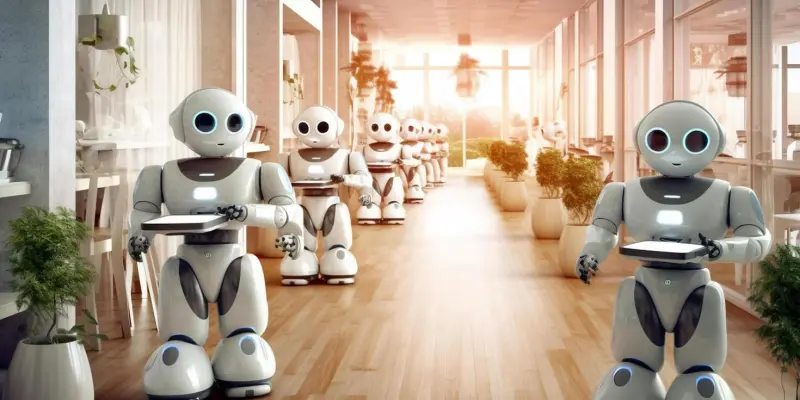In the rapidly evolving landscape of technology integration within service industries, the adoption of Nvidia AI-powered robots has emerged as a transformative force. These advanced robotic systems, developed by Richtech Robotics, are already redefining various aspects of customer service and operational efficiency in sectors such as hospitality, retail, and healthcare. The introduction of these robots highlights a pivotal shift towards automation and artificial intelligence, emphasizing the potential of these technologies to tackle labor shortages and elevate the quality of service delivery. Notably, Richtech Robotics has been pioneering this integration with humanoid robots equipped with Nvidia AI, marking significant milestones in automation across different environments.
Deployment in Retail and Restaurant Settings
One of the most pronounced implementations of Nvidia AI robots can be observed in the retail and restaurant settings. Richtech Robotics has successfully launched the One Kitchen restaurant within Walmart Supercenter in Peachtree City, Georgia. In this setting, robots like the Scorpion are equipped to serve coffee, milk teas, and fruit tea beverages, interacting directly with customers. This collaboration with Ghost Kitchens America not only underscores the practical application of AI in food service but also signifies a strategic move towards enhancing customer engagement and streamlining operations in high-traffic areas. These robots are capable of monitoring the environment, crafting beverages, and offering personalized service, thereby creating a unique customer experience.
In another example, the Clouffee and Tea restaurant in Las Vegas features the Adam robot serving coffee and desserts. Unlike its counterparts, the Adam robot collaborates with store associates, handling more complex interactions by providing items that require human assistance, such as snacks or bottled drinks. This collaboration between AI robots and human staff demonstrates an innovative approach to retail service, where the strengths of both human and machine are harnessed to optimize efficiency. These robots also show remarkable adaptability, processing commands in multiple languages and offering drink recommendations, which further highlights their convenience and user-friendly design.
Advancements Beyond Commercial Spheres
Richtech’s vision extends beyond commercial applications, as seen in their recent initiatives aimed at fostering innovation in academic institutions. The company’s accelerator program, targeted at U.S. universities, provides development frameworks and access to autonomous mobile robots and robotic arm platforms powered by Nvidia technology. This initiative is designed to encourage advancements in machine vision, AI interaction, and robotic arm path planning. The program tailors solutions to specific industries, with Columbia University being the first participant, focusing on natural language processing within robotic systems. The emphasis on educational collaboration aims to bridge the gap between theoretical research and practical implementation, thereby contributing to various sectors such as manufacturing and healthcare.
Additionally, Richtech’s participation at CES in Las Vegas showcased the versatility of Nvidia AI robots in diverse applications. Models like the Adam interactive robot and the Scorpion drink-serving robot demonstrated their potential in both the hospitality and healthcare industries. This exhibition highlighted the robots’ capabilities not only in routine tasks but also in more complex functions like patient interaction and support in medical settings. Richtech’s commitment to expanding these applications points towards a broader acceptance and integration of AI in everyday operations, reflecting a significant trend towards automation and intelligent service solutions.
Enhancing Operational Efficiency and Customer Engagement
The integration of Nvidia AI robots in service industries is primarily driven by the need to enhance operational efficiency and improve customer engagement. In high-traffic retail environments, these robots can handle routine tasks with precision and consistency, allowing human staff to focus on more nuanced customer interactions. According to Matt Casella, President of Richtech Robotics, the deployment of these AI-powered robots significantly boosts efficiency, as they can handle a myriad of customer service tasks without fatigue. The robots’ ability to process commands in multiple languages and offer personalized recommendations ensures a high level of customer satisfaction, contributing to a more dynamic and engaging shopping experience.
Furthermore, the use of AI robots addresses the pressing issue of labor shortages in various industries. By automating repetitive and time-consuming tasks, businesses can allocate their human resources more effectively, focusing on areas that require critical thinking and personal interaction. This approach not only improves service delivery but also creates a more sustainable operational model. The robots’ adaptability and seamless integration into existing workflows highlight their potential to be indispensable tools in future commercial and service-oriented settings.
Future Prospects and Sustainability
In the fast-changing world of technology integration within service industries, the adoption of Nvidia AI-powered robots has emerged as a game-changer. Developed by Richtech Robotics, these advanced robotic systems are reshaping various facets of customer service and operational efficiency in sectors like hospitality, retail, and healthcare. The deployment of these robots underscores a significant shift towards automation and artificial intelligence, showcasing the potential of these technologies to address labor shortages and enhance service quality. Richtech Robotics has been at the forefront of this integration, introducing humanoid robots equipped with Nvidia AI. Their efforts represent notable milestones in automation, demonstrating how these robots can adapt to and function within different environments. This technological advancement not only exemplifies remarkable engineering but also shows a practical application of AI in everyday scenarios. The impact of these humanoid robots is only beginning to be understood as they pave the way for new standards in service delivery and operational efficiency in various industries.

